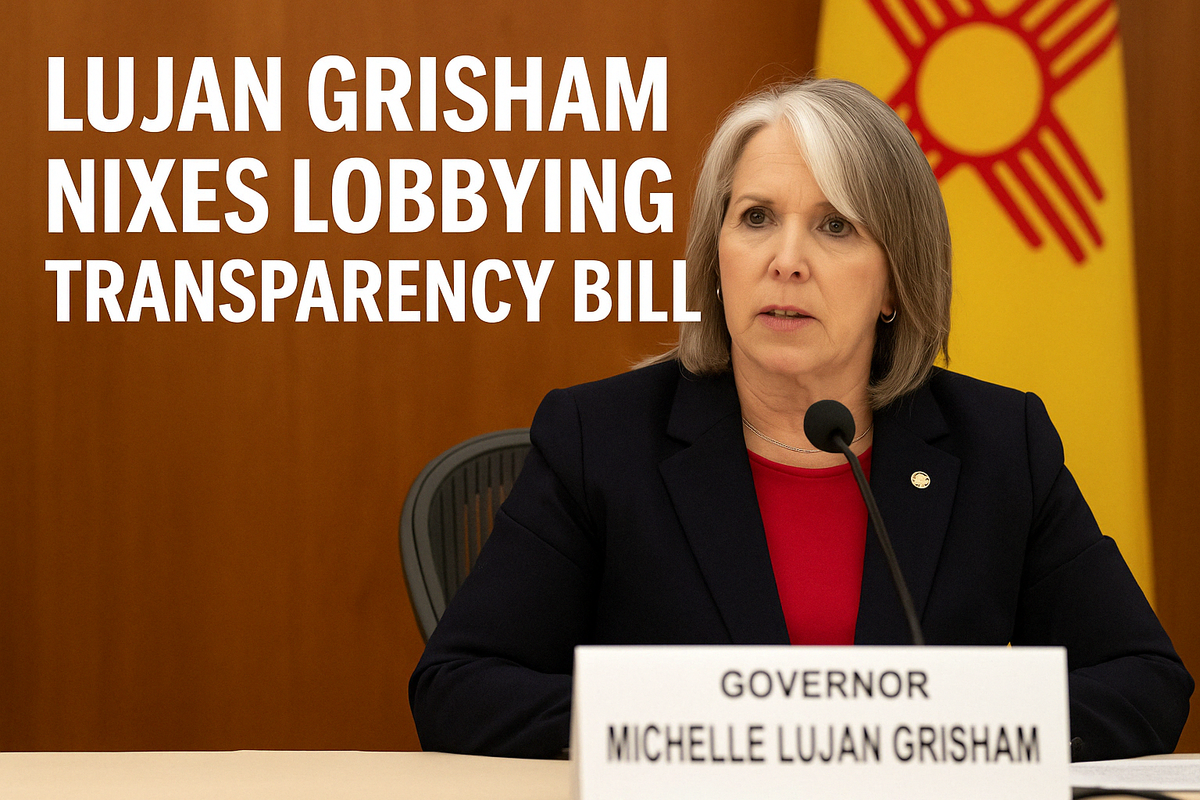Lujan Grisham nixes lobbying transparency bill
Gov. Michelle Lujan Grisham vetoed a bill that would have increased transparency around lobbying in New Mexico. Lawmakers say her decision protects the status quo and leaves the public in the dark.

The bill, co-sponsored by two Las Cruces Democrats, would have required lobbyists to disclose which legislation they were working to support or oppose
Marjorie Childress, New Mexico In Depth
Gov. Michelle Lujan Grisham vetoed a bill Friday that would have helped New Mexicans keep track of what bills lobbyists were trying to kill or pass, bringing much more sunlight to a generally opaque legislative process.
House Bill 143, sponsored by Rep. Sarah Silva and Sen. Jeff Steinborn, both Democrats from Las Cruces, would have required lobbyists to publicly report the bills they are working to support or defeat during the session.
Lujan Grisham wrote in her veto message that HB143 needed work and that she looks forward to “working with the Legislature in the next session on a bill that really adds transparency and accountability.”
“It’s a big letdown,” said Steinborn, who has pushed for greater lobbying transparency over the past decade. “The governor had an opportunity to make a big step forward in transparency to improve government but instead opted to protect the status quo where lobbyists and insiders have an undisclosed role in shaping and disrupting policy in New Mexico.”
In a statement Silva said the governor’s decision would keep New Mexicans in the dark about “issues where lobbyists are exerting so much influence – like doctors leaving our state, people being unable to secure affordable housing, and the ongoing challenges we are wrestling with related to our young people and public safety.”
Steinborn said he would welcome working with Lujan Grisham to craft a bill she could support during the 2026 legislative session, if she chose to prioritize it. In New Mexico’s legislative process, every other year the governor must greenlight non-budgetary legislation during shorter legislative sessions. In 2026, that will be the case. In 2027, when lawmakers can introduce bills on any topic, Lujan Grisham will no longer be governor.
It’s unclear how many lobbyists asked Lujan Grisham to veto the bill, because currently, New Mexico does not require lobbyists or the governor to file such reports. What bills lobbyists are trying to influence or their positions on them are largely unknown to the public.
“It’s ironic that HB143 would have given us information about who lobbied the governor to veto this bill – and without it, we have no way to know,” Silva said in her statement. “In other words, her veto demonstrates the need for the very legislation she killed today.”
HB 143 would have had New Mexico following the lead of at least 15 other states that require lobbyists to report the bills they are working on, according to a 2018 analysis by the National Conference of State Legislatures.
But lobbyists told New Mexico In Depth and other news organizations after the bill passed that they had concerns about the viability of a requirement in the bill that they file reports within 48-hours of lobbying activity.
There were more than 600 people registered as lobbyists during the session that ended March 22, many of whom met or socialized with lawmakers, testified in committees, and in some cases, worked with the groups they represent to organize outside campaigns involving advertising and community phone calls to influence the outcome of legislation.
Lujan Grisham, in her veto message, said the bill would be “onerous” on lobbyists because of the 48-hour requirement “irrespective of weekends and holidays.”
She had other issues with the bill as well.
It’s unclear, her message states, how the legislation applies to lobbying activity during the 20 days the governor has to sign or veto bills, after a session ends. And, she wrote, it’s unclear what sort of change in position would trigger a lobbyist having to file a new report.
“Suppose a lobbyist’s employer who is supporting a piece of legislation has concerns about a new provision added in committee that they desire to have removed. Would this require an updated activity report if they still support the other portions of the legislation? What if they are now just neutral? HB 143 does not specify,” her message states.
Lujan Grisham concluded by saying she thought that elected officials with a “donor base” — like legislators and governors — should also disclose when their positions change.
Marjorie Childress is managing editor at New Mexico In Depth.
